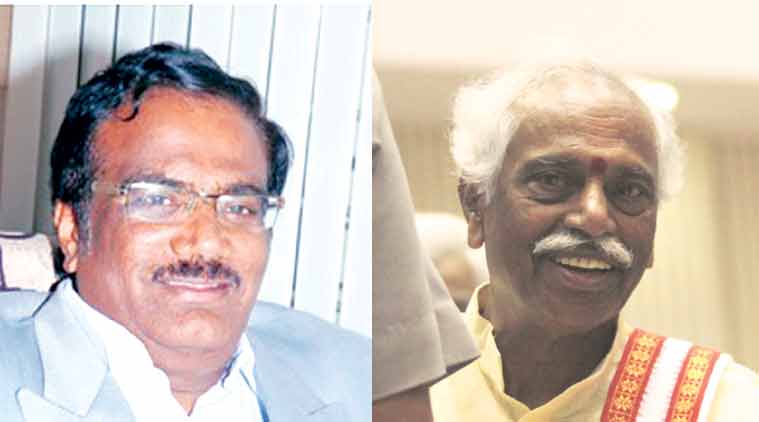Stay updated with the latest - Click here to follow us on Instagram
Rohith Vemula suicide case: Had new SC law been notified, it would have got minister, V-C in net
The offences for which they have been booked are cognisable and non-bailable, and allow a police officer investigating the case to arrest them without a warrant.
 Minister Bandaru Dattatreya and Vice-Chancellor P Appa Rao.
Minister Bandaru Dattatreya and Vice-Chancellor P Appa Rao.
Minister of State Bandaru Dattatreya and Hyderabad University Vice-Chancellor P Appa Rao, named in an FIR registered by police following the suicide by Dalit student Rohith Vemula, could have been arrested had the Centre notified the Scheduled Castes and the Scheduled Tribes (Prevention of Atrocities) Amendment Bill, 2015.
The offences for which they have been booked are cognisable and non-bailable, and allow a police officer investigating the case to arrest them without a warrant. But the amendments have not become part of the law so far.
The Bill, which provides for stringent punishment to anyone found guilty of crimes against a person belonging to the Scheduled Castes and/or Scheduled Tribes, was granted assent by President Pranab Mukherjee on January 1. But it has not been notified by the Ministry of Social Justice and Empowerment since rules governing the amended law are still to be finalised.
“We are trying to finalise the rules now. Hopefully, the new Act will come into effect by the end of this month. As of today, the old Act, without the amendments, remains in force. Since the case against the minister (Dattatreya) and others was filed before the amendments take effect, it will be tried under the old law,” a government functionary said.
[related-post]
The amendments, once given effect, will widen the scope and definition of offences that can be held to have been committed against SCs and STs, adding several new offences to the list.
Among the new offences added to the law are garlanding a SC/ST person with footwear, instituting false, malicious or vexatious suit or criminal or other legal proceedings against a SC/ST member, giving false or frivolous information to any public servant and thereby causing such public servant to use his lawful power to the injury or annoyance of a member of a SC/ST, attempting to promote feelings of ill-will against SCs or STs, imposing or threatening a social or economic boycott.
Legal experts say many of these charges could have been pressed against the minister and others had the amended law been notified.
Preventing a Dalit from entering a place of worship, using common property resources and entering an education or health institution are also offences under the new law. It also defines what constitutes “wilful negligence” by public servants, something that would attract penal provisions. These include a police officer not registering an FIR under the Act or not registering the FIR under the appropriate sections of the Act.
The amended law also provides for setting up of “Special Courts and Exclusive Special Courts” to decide cases under it.
Incidentally, just before it went to polls, the previous UPA government had promulgated the Scheduled Castes and the Scheduled Tribes (Prevention of Atrocities) Amendment Ordinance but the Modi government allowed the ordinance to lapse, deciding instead to introduce a Bill to this effect in Parliament.
While Lok Sabha passed the amendments on August 4 last year without discussion, the Rajya Sabha passed it on December 21.







